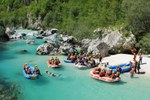News
Visitor flows under control

How can a comic inspire you to leave no trace? What happened in the Berchtesgaden National Park after a well-known influencer posted about the natural infinity pool at the Königsbach Falls? And how do influencers raise awareness against littering in nature? Visitor management is a cross-cutting issue for which many regions lack a competent body. This is where speciAlps2 came into play: two international project meetings in Luče/SL and Balme/I, together with an online conference, provided a platform for exchanging experiences at Alpine level during the two-year speciAlps2 project. The results can be seen and heard in the form of podcasts as well as an interactive Alpine map with good examples for visitor guidance. The project was supported financially by the German Federal Ministry for the Environment, Nature Conservation, Nuclear Safety and Consumer Protection (BMUV): the activities were coordinated by CIPRA International and the Alliance in the Alps network of municipalities.
Four pilot regions
The Italian pilot municipality of Balme, with the support of the University of Turin, carried out a vehicle count on the “Pian della Mussa” plateau, which is a protected nature reserve and suffers from too much visitor traffic. The Slovenian pilot region of the Steiner and Sanntaler Alps focused above all on communication and information. A workshop on tourism communication in the mountaineering village of Kamnik raised awareness among those responsible for common values, such as preservation of the excellent water quality that is a special feature of the region. The topics and challenges in the Austrian pilot region of the Tiroler Lech Nature Park are manifold. The regional project team therefore developed a visitor management concept, established a steering group and now plans to increase both the human and financial resources. The German pilot region of Bad Reichenhall focused on mobility, as the location resembles a traffic bottleneck with its tourist hotspots such as the Thumsee and the Nonner Oberland – popular starting points for hiking tours. From 2023, parking space management and digital parking guidance systems aim to provide relief to the region. Finally, the possibilities for sustainable mobility in the region were addressed in a workshop: E-bikes, shuttles, benches for carpooling and the expansion of the cycling infrastructure.
The speciAlps2 project ended in 2022, with ideas for follow-up projects already in the works. It is foreseeable that the pressure on natural spaces will continue to increase, for example due to the climate crisis, as project manager Magdalena Holzer states: “There can't be enough initiatives like speciAlps2 to ensure that the visitor experience remains of a high quality and that learning from each other is strengthened throughout the Alps.”
Podcasts:
#1 How to protect the Alps with your behavior! // The speciAlps2 Code of Conduct
#2 Who takes care of visitor management in the Alpine region? // The speciAlps2 political compact
Interactive map:
https://map.cipra.org (de, fr, it, sl)
Further information:
www.cipra.org/de/specialps2 (de, fr, it, sl, en)




